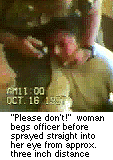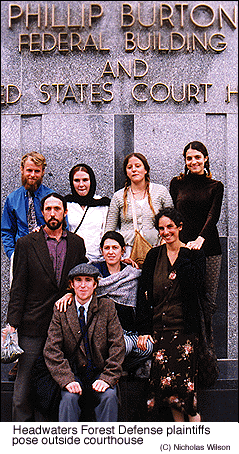
Pepper Spray Activists Win Major Court Victory
by Nicholas Wilson
 |
by Nicholas Wilson |
|
A
federal appeals court has ordered a new trial for Headwaters Forest activists who had pepper spray swabbed and
sprayed directly into their eyes by Humboldt County sheriff's deputies in 1997.
The important, unanimous decision clarifies constitutional limits on police use of force, and the published opinion will have nationwide impact on the growing trend toward police use of chemical weapons on protesters. The court also ordered Humboldt Sheriff Dennis Lewis and his chief deputy back into the case as individual defendants, ruling they are not entitled to immunity, which makes them liable for punitive damages. It was clear that the court would have decided the case once and for all in favor of the activists, if it had been up to them. But the law says factual disputes must be resolved by a jury.
|
|
 Widespread
shock and public outrage resulted when gruesome police videos
were broadcast worldwide on TV showing young women activists
screaming in pain after deputies pulled their heads back and methodically
applied pepper spray directly to their eyes. Many called it torture,
including a San Francisco Examiner editorial. It was the first case in the
nation where police applied pepper spray with cotton swabs directly to the
eyes of nonviolent political protesters.
Widespread
shock and public outrage resulted when gruesome police videos
were broadcast worldwide on TV showing young women activists
screaming in pain after deputies pulled their heads back and methodically
applied pepper spray directly to their eyes. Many called it torture,
including a San Francisco Examiner editorial. It was the first case in the
nation where police applied pepper spray with cotton swabs directly to the
eyes of nonviolent political protesters.
In the court's decision, published May 4, a three-judge panel of the 9th Circuit Court of Appeals ruled that the nine forest activists are entitled to have a jury decide if Humboldt County deputy sheriffs used excessive force on three occasions when they used pepper spray on the seated, nonviolent demonstrators. The activists had locked their wrists together inside metal pipes which they called "black bears" in order to prolong their protests against terms of the Headwaters acquisition deal. On two occasions, when protesters still refused to yield after pepper spray was daubed on their eyelids, deputies then sprayed bursts of the caustic chemical at full force into the protesters eyes from inches away. The appeals court found the lower court judge had erred in deciding the case himself rather than allowing a second trial when the first jury could not reach a verdict. The case is known as Headwaters Forest Defense vs. County of Humboldt. Attorney Tony Serra issued a statement saying: "The reversal is a triumph of justice for all citizens who oppose police brutality. With great gusto we will resubmit the issue to the jury, and we are confident that they will not allow this kind of police tactic -- which is no different from police torture -- to prevail." Serra was not involved in the first trial or the appeal, but will represent the activists in a new trial.
|
|

As previously reported in the Monitor, a dramatic 1998 trial in the activists' federal civil rights suit against the county sheriff and Eureka city police ended in a hung jury, split four to four. District Judge Vaughn Walker, who presided over the trial, scheduled a second trial, and noted attorney Tony Serra took over as the activists' new lawyer. But Walker later reversed himself, granting a defense motion for a judgment "as a matter of law" against the activists after he concluded that no reasonable jury could find that the deputies had used excessive force on the basis of the evidence presented at the first trial. In a case where jury trial is demanded, a judge can only decide the case as a matter of law if there are no disputed facts for a jury to resolve. Walker also excused Humboldt Sheriff Dennis Lewis and his chief deputy from the case by ruling that they were entitled to qualified immunity. The appellate opinion written by Circuit Judge Harry Pregerson included the following summary of its view of the excessive force issue:
In sum, the district court's conclusion that the officers did not use excessive force to effect the arrests of the protesters as a matter of law is untenable given the evidence presented at trial. Whether the officers reasonably needed to apply pepper spray -- either with Q-tips to the protesters' eyelids or by short full blasts into their faces -- to arrest the protesters was in dispute. It is clear to us that a fair-minded jury could return a verdict for the plaintiffs on the evidence presented. In an added comment, Judge Myron Bright wrote that "the most important issue in the case has been resolved" now that "this court has established that the use of pepper spray in the eyes and on the faces of nonviolent, passive demonstrators may amount to an unreasonable use of force in violation of the Fourth Amendment." He urged the parties to compromise and settle the case rather than risk another hung jury.
|
|
 Before
the appeal was heard, the activists had offered to drop claims for
monetary damages if the Sheriff and Eureka police would admit wrongdoing
and end their practice of using pepper spray on nonviolent demonstrators.
Both departments refused the settlement offer and made such use of pepper
spray their official policy. In October, 1998, after the first trial ended
in a hung jury and before Judge Walker dismissed the activists' suit,
Humboldt deputies again used pepper spray on locked down demonstrators
trying to stop Pacific Lumber logging at the site where David "Gypsy" Chain
had been killed by a redwood tree felled by an angry logger.
Before
the appeal was heard, the activists had offered to drop claims for
monetary damages if the Sheriff and Eureka police would admit wrongdoing
and end their practice of using pepper spray on nonviolent demonstrators.
Both departments refused the settlement offer and made such use of pepper
spray their official policy. In October, 1998, after the first trial ended
in a hung jury and before Judge Walker dismissed the activists' suit,
Humboldt deputies again used pepper spray on locked down demonstrators
trying to stop Pacific Lumber logging at the site where David "Gypsy" Chain
had been killed by a redwood tree felled by an angry logger.
Mark Hughes, an attorney with Earth Law, a public interest law firm based in Denver and Palo Alto, handled the appeal for the activists. He said the decision is important because, "It means that the police can't inflict incredible, excruciating pain on nonviolent political protestors. That's a good thing regardless of which political stripe you are." Asked if he thought the decision would curb the growing use of pepper spray on political protesters elsewhere, including recently in Seattle and in Washington, D.C., Hughes said, "I think the decision draws a line for police. The force that a police officer can use on any free citizen has to be proportional to the danger posed by that citizen, or the governmental interest at stake. In the case of nonviolent political protesters, that interest doesn't exist; certainly not in this case. Instead of negotiating, the police just escalated. With minimal governmental interest at stake, the police administered a chemical that causes searing, burning, excruciating pain. The law has been clear for a long time that that's not acceptable, and the police should have known that." Nancy Delaney, the attorney for Humboldt County and the City of Eureka, told reporters last week she will file further appeals, with the first step being to petition the 9th Circuit to rehear the appeal before the full court. Delaney did not return the Monitor's calls to her office seeking further comment. Her office said she was in San Francisco. When the Monitor called the Humboldt Sheriff's office, Sheriff Lewis's secretary said he would have no comment, and referred all questions about the ruling to Delaney's office. Asked if any change had been made or was contemplated in the department's policy regarding use of pepper spray on nonviolent protesters, the secretary went off the line briefly, then replied, "I checked with my superiors, and they said no." Plaintiff Spring Lundberg called the appeal victory "staggering." She said although it felt "horrible" when Judge Walker threw their case out, it worked out for the best because it shunted the case directly to the appeals court. The resulting ruling corrected Walker's erroneous interpretations of law and fact, she said, and it defines new case law that makes it more likely the activists will win their second trial. Having the two top officers back in the case is an extra bonus, she said, adding: "I'm really looking forward to taking this back to trial. Having the policy makers be liable as individuals will really increase the ripple effect if we can win this trial." Lundberg said it was very important to her and the other plaintiffs to stop the increasing police use of chemical weapons on nonviolent demonstrators because: "Pepper spray is like lynch rope in a can. It's like playing Russian roulette because it could be fatal for people with respiratory or heart conditions. There have been over 100 deaths associated with pepper spray use." Lundberg said she was delighted to have Tony Serra as attorney, adding: "I love his fearless attitude ... he's really kick-ass. I think it's significant that he's also doing the Judi Bari suit against the FBI; I like that tie-in between the past of our movement and the present." Serra scoffed at the suggestion of settling the case: "The plaintiffs want to stop police brutality. They're not interested in money; these are idealists. We want to have a jury condemn the practice, as the 9th Circuit has done implicitly. Money is not the objective. We want to show that the conscience of the community will not tolerate this kind of self-evident torture, law-enforcement torture. We want to publicize this and stop this practice, and that's the objective of the lawsuit. So we're not going to take any handouts; we're not interested in the money. We are going to go to trial!"
|
|
The
American Civil Liberties Union of Northern California filed a friend of
the court brief in the appeal. The ACLU brief points out that the Ninth
Circuit last year ruled that pepper spray may constitute a dangerous weapon
when used by criminal defendants, justifying increased prison sentences.
ACLU staff attorney Margaret Crosby, who co-authored the brief, called
Humboldt officers' use of pepper spray "a kind of chemical cattle prod."
According to Crosby: "Scientific literature refutes the repeated depiction, by the trial judge and by Humboldt, that pepper spray is a benign organic substance that causes only transient discomfort. In fact, pepper spray ingredients, alone and in combination with solvents that create the weapon, have a variety of physiological effects. Studies show that pepper spray may produce carcinogenic effects."
In February, Eugene, Oregon, announced a new policy on police use of pepper spray which says the it should be used only on individuals who may harm themselves, officers, or others. Pepper spray may not be used to disperse a crowd, and officers may not spray someone repeatedly. Before, officers could use it whenever they reasonably believed it was necessary. Because of the new policy, the ACLU dropped plans to sue the city on behalf of four bystanders who said they suffered ill effects from pepper spray which police used to disperse protesters opposed to cutting a stand of trees for a development project. There was wholesale use of pepper spray and other chemical and "less-than-lethal" weapons by Seattle Police in efforts to disperse nonviolent protesters against the World Trade Organization meeting there last December, and several lawsuits are expected to come out of that. On a smaller scale, pepper spray was used again last month against nonviolent demonstraters against the International Monetary Fund and World Bank in Washington, D.C. Los Angeles Police Commander Thomas Lorenzen, who is coordinating security for the Democratic National Convention in August, said he was familiar with the Humboldt case but had not seen the appellate decision. Lorenzen said, however, "We do not use pepper spray on nonviolent protesters and we would not do so."
|
|
As
a historical footnote, the videotaped incident shown on national TV in
1997 took place in the Eureka office of then-Congressman Frank Riggs,
Republican, an ardent timber industry supporter. A former police officer
himself, Riggs strenuously defended the use of the chemical weapon on what
he called eco-terrorists. Riggs even arranged for a Congressional hearing
into the incident, where testimony was given by Riggs himself, members of
his office staff, and proponents of the anti-environmental "Wise Use"
movement. However, Riggs so wounded himself politically by that stance that
he opted not to run for reelection in 1998. The San Francisco Chronicle
reported in December of that year that: "The Windsor Republican announced
yesterday he is joining DriWater, a Santa Rosa company that makes gel
inserts, affectionately called 'slime balls,' which slowly release water
for crops and houseplants."
Albion Monitor
May 10, 2000 (http://www.monitor.net/monitor) All Rights Reserved. Contact rights@monitor.net for permission to use in any format. |